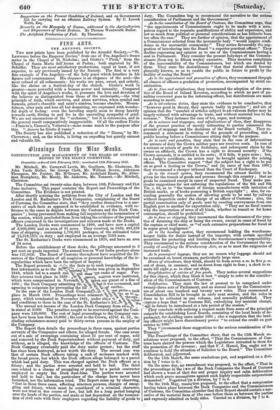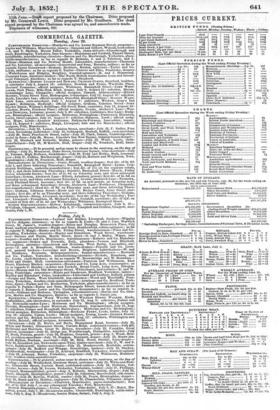t inning's fru' t4t %Int %nub.
CONSTITUTION AND MANAGEMENT OF THE BOARD OF CUSTOMS: REPORT OF THE SELECT COMMITTEE.
Committee ordered 10th February 1852 ; nominated 12th February 1852.
Mr. Mitchell, Mr. Cornwall Lewis, Mr. Goulburn, Mr. Gladstone, Sir John Yarde Buller, Sir George Clerk, Mr. William Brown, Alderman Thompson, Mr. Forster, Mr. M'Gregor, Mr. Archibald Heade Mr. Alder- man Humphery, Mr. Moody, Mr. Anderson, Mr. Tennent.—Mr. Mitchell, Chairman.
The Committee sat twenty-nine days, between 16th February and 21st June inclusive. This paper contains the Report and Proceedings of the Committee. The Evidence is not printed.
After shortly noticing the petitions from the City of London and the London and St. Katharine's Dock Companies, complaining of the Board of Customs, the Committee state, that "they confine themselves to a nar-' rative of such facts as appeared to be established in evidence, with re- ference to the cases in dispute between the Customs and the Dock Com- panies" ; being prevented from making full inquiriesby the termination of the session, which precluded them from taking the evidence of the practical officers concerned in the investigations and seizures made at the Docks. The London. Docks were commenced in 1800, and have now a capital of 3,900,0001. and an area of 91 acres. They received, in 1850, 403,358 tons of shipping ; containing 1,706,861 packages, of the estimated value of 13,518,1871. ex duty ; and employed on an average 3183 men. The St. Katharine's Docks were commenced in 1825, and have an area of 24 acres.
Before the establishment of these docks, the pilferage amounted to 5 per cent on goods imported. The annual loss on West India produce alone was 137,0331. The Board of Customs throughout have acquitted the Di- rectors of the Companies of all suspicion or personal knowledge of the ir- re 'ties which have been the subject of inquiry. e Report proceeds to the facts as to such irregularities. The
first information as to the Se°`""mr •.---'8Socks was given in September
")0uring
1849, which led to a search an;a 00- than-^,,en casks of sugar. Fur- ther seizures took place in 1850: **4 secret, wianon were instituted, which were compromised in Novemgk Op), taken our goent of a fine of 1001. i the Dock Company admitting flu, .1:kg. etAgt it was noccurred, and
agreeing to cooperate for preventing the lie earthei. In the case of the London Dock Company?,. took
place in March 1850. Proceedings were comment 5.;:›1A t° ni pany, which terminated in November 1851, under sui,a..ge, ecl • and conditions to those in the case of the St. Katharine's D6'..1144%x3xpress a hope that "no Customs Bill, embodying any material change, The annual net income of the London Dock Company from si'Aeq.'_. _ 11 in future be introduced at a late period of the session." . . is stated at 31091. The penalties sought to be recovered against the Com- pany were 120,0001. The cost of legal proceedings to the Company can- not have been less than 10,0001.; the cost to the Crown, 45701. 4s. 7d., in- cluding subsistence-money paid to thirty-seven persons in the employ of the Company. The Report then details the proceedings in three cases, against parties servants of the Companies and others, for alleged frauds. One case arose out of a sale of sweepings containing about 22 per cent of sugar, sold and removed by the Dock Superintendent without payment of duty, and without, as is alleged, the knowledge of the officers of Customs. The Dock Company eventually paid the duty under protest; but the stuff has since been destroyed, as not worth the duty. The second case was that of certain Dock officers taking a cask of molasses marked with the broad arrow, but which the Dock officers allege belonged to a parcel which had paid duty. This was charged against the Dock officers as a felony; and the parties were arrested and held to bail. The third case related to a charge of smuggling of pepper by a parish contractor employed to empty the Dock dust-bins. The parties were arrested and held to bail ; but the particulars of the charge have never been furnished, nor the information tried. The Report sums up by observing, "that in these three cases, affecting nineteen persons, charges of smug- gling and felony, which must be considered of a criminal character, were not tried in due course of law, but left for a long period hanging over the heads of the parties, and made at last dependent on the termina-
• bey conclude with noticing a request made from some of the principal outpos=ts for establishing Local Boards, consisting of the local heads of de- partment, for deciding cases under 1001. ; also a suggestion that the land- ing officers might have discretionary power " to extend the credit on post entries to1100/."
They "recommend these suggestions to the serious consideration of the Treasury.'^ The Prociredings of the Committee show, that on the 12th March re- solutions were proposed, to the effect, "That the Commissioners of Cus- toms have abucsecl the powers which the Legislature intrusted to them for the protection df the revenue; and that F. J. Hamel, Esq. ought not to continue to hoht,the situation of Solicitor to the Board." The Committee deliberated, and 4curned•
On the 15th Mateh, the same resolutions put, and negatived on a divi- sion by 7 votes to 6."..
On the same day, so amendment was proposed, to the effect, " That in the proceedings in the (am of the Dock Companies the Board of Customs had shown a want of tllat due and proper inquiry and calm deliberation which such grave accusations against such highly respectable corporations
demanded." Negatived a division, by 7 to 6. On the 24th May, resoln tion proposed, to the effect that a compromise having taken place betweertthe Dock Companies and the Commissioners of Customs, the Committee consider that their Report should contain a nar- rative of the material facts of ):he case before them as between the parties duty. The Committee beg to recommend the narrative to the serious consideration of Parliament and the Government."
As to the constitution of the Board of Customs, the Committee urge, that "the appointments of Commissioners ought to be made with a scru- pulous regard to the requisite qualifications of ability and experience, and not so much from political or personal considerations as has hitherto been too often the ease.' They are further of opinion, that the appointment of a Commissioner selected from the mercantile body "would inspire confi- dence in the mercantile community." They notice favourably the sug- gestion of introducing into the Board " a superior practical officer." They decline expressing any opinion as to one of the Commissioners having a seat in Parliament. They consider the present holydays of the Commis- sioners (from ten to fifteen weeks) excessive. They mention complaints of the inaccessibility of the Commissioners, but which are denied by them. They state the desirableness " that that denial should become generally known, so as to enable the public in future to profit by the facility of seeing the Board."
As to the appointment and promotion of officers, they recommend thrqugh all classes of officers a gradation of promotion, accompanied by strict ex- amination.
As to fines and satisfactions, they recommend the adoption of the prac- tice of the Board of Inland Revenue, according to which no part of pe- nalties recovered goes to the informing officer, but distributions are made according to merit.
As to ad-valorem duties, they state the evidence to be conclusive, that
however good in theory, they operate badly in practice " ; and are of opinion that the "number of articles subject to ad-valorem duties may be largely reduced with advantage to trade, and without material loss to the revenue." They instance the case of tea, sugar, and nutmegs.
As to seizures and stoppages, and adjudications of them, they disapprove of the present practice of merely intimating to parties concerned the grounds of stoppage and the decisions of the Board verbally. They re- commend a statement in writing of the grounds of proceeding, and a public hearing before a Commissioner sitting daily for the purpose. As to costs and penalties, they state that in the ease of informations for arrears of duty the Crown neither pays nor receives costs. In case of a seizure or return of goods for forfeiture, and subsequent claim by the owner on affidavit, the Crown has a right to demand security : if the Crown succeeds, it is entitled to its costs ; if it fails, it pays none ; but, on a Judge's certificate, an action may be brought against the seizing officer. The Committee suggest "that the subject has a right to be put on as good a footing as the Crown," and (in cases of less than 1001.) they recommend a cheaper tribunal than the Court of Exchequer. As to the transit system, they recommend the utmost facility to be given for the transit of goods and persons through this country ; that no goods be examined except in cases of suspected fraud. They make par- ticular suggestions for not enforcing the regulations of the 8th and 9th Vic. c. 63, as to "the transit of foreign manufactures with imitation of British marks, or of books possessing a British copyright" ; also, for ex- tending generally the system of allowing goods to be sent by railway without inspection under the charge of an officer of Customs ; also, the partial examination only of goods sent by coasting conveyances from one English port to another for exportation only. "They see no fiscal reason why the importation of arms of all kinds, whether in transit or for home consumption, should be prohibited." As to fines on shipping, they recommend the discontinuance of the prac- tice of detaining the ship or fining the owner, except in cases of fraud by the captain or chief mate, or "of such extensive preparations for fraud as to argue great negligence." As to the bonding system, they recommend holding the warehouse- keeper liable for duties instead of the importer, with certain specified securities for protecting and limiting the warehouseman's responsibility. They recommend to the serious consideration of the Government the ne- cessity of modifying the Warehousing Acts, so as to meet the exigencies of increased trade.
As to passengers' luggage, they see no reason why luggage should not be examined on board steamers, particularly large ones. Hours of attendance, they think, should be from seven a.m. to five p. en. out of doors, in summer, and in-doors from eight to four ; a clerk to re main till eight p.m. to clear out ships. Simplification of entries of free goods. They notice several suggestions for this object, which they think it best " simply to refer to the consider- ation of the Commissioners of Customs."
Codification. They state the law at present to be comprised under twenty-three acts of Parliament, and an annual issue by the Commission- ers of about one hundred and twenty new rules. They recommend a Consolidation Bill to be brought in early next session, and the rules in force to be collected in one volume, and annually published. They
11th June.-Draft report proposed by the Chairman. Ditto proposed by Mr. Cornewall Lewis. Ditto proposed by Mr. Goulburn. The draft report proposed by the Chairman was agreed to, and amendments made.
Expenses of witnesses, 681.



























 Previous page
Previous page